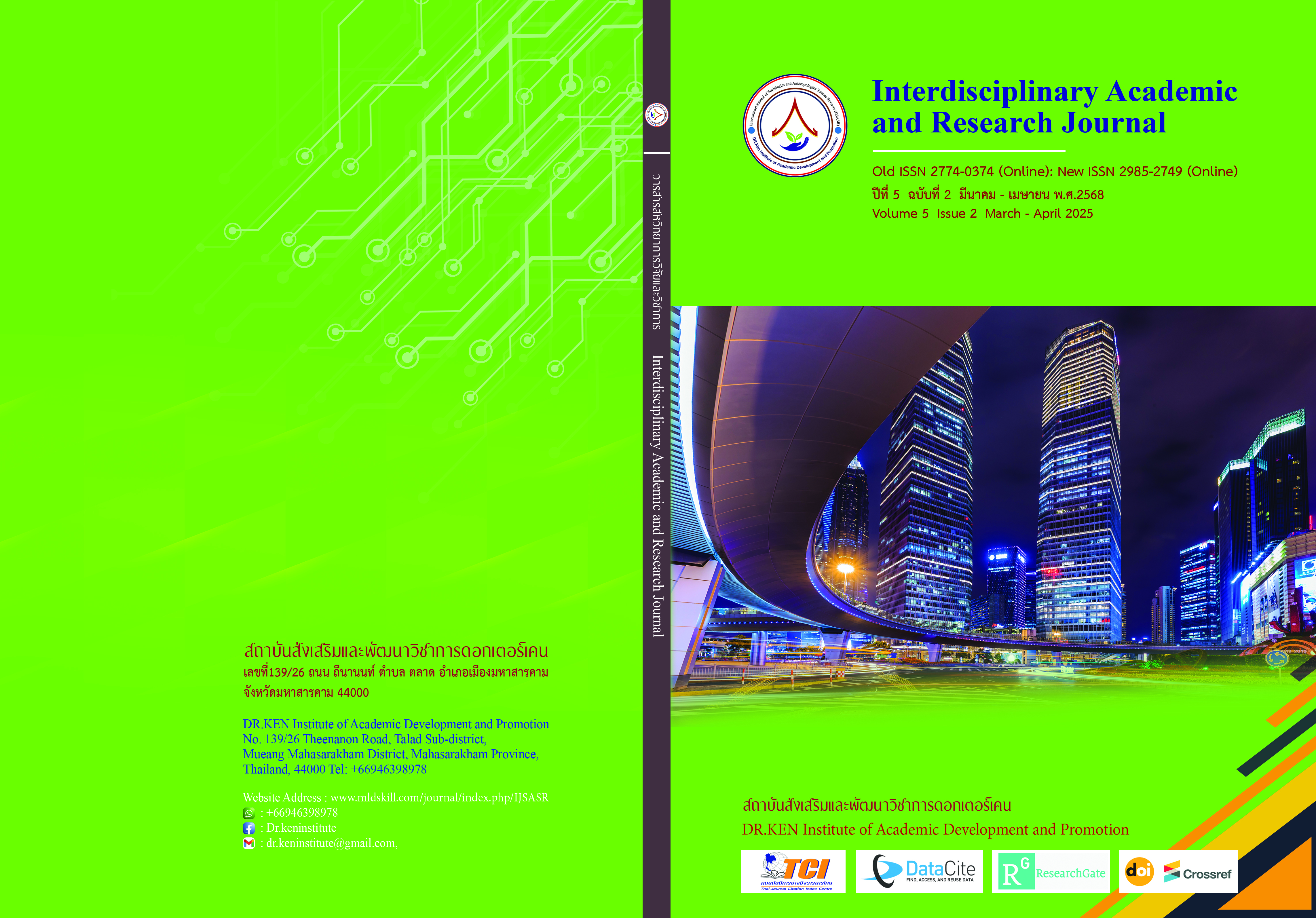Digital Leadership of School Administrators Affecting Teachers’ Work Well-being under Prachinburi Primary Educational Service Area Office 1
DOI:
https://doi.org/10.60027/iarj.2025.282305Keywords:
Digital Leadership, School Administrators, Teachers' Work Well-beingAbstract
Background and Aims: Technological transformations in the digital era have significantly impacted educational systems, generating both opportunities and challenges for teachers and school administrators. The digital leadership of administrators is of paramount importance for the effectiveness of academic management and enhancing teacher job satisfaction. Recognizing this significance, the Prachinburi Primary Educational Service Area Office 1 has implemented a project to promote the use of digital management systems. This initiative aligns with the educational quality development framework "4 Good, 4 Create, 4 Happiness," as outlined in the Basic Education Development Plan (2023-2027). The project aims to cultivate digital leadership competencies among school administrators (Prachinburi Primary Educational Service Area Office 1, 2023). Consequently, the objectives of this research are to 1) to examine the level of digital leadership among school administrators under Prachinburi Primary Educational Service Area Office 1; 2) to assess teachers' work well-being under Prachinburi Primary Educational Service Area Office 1; 3) to investigate the relationship between school administrators' digital leadership and teachers' work well-being under the Prachinburi Primary Educational Service Area Office 1; and 4) to develop a predictive equation for school administrators' digital leadership that influences teachers' work well-being under Prachinburi Primary Educational Service Area Office 1.
Methodology: This study employs a quantitative research approach. The sample consists of 291 teachers under Prachinburi Primary Educational Service Area Office 1 for the 2024 academic year, selected through simple random sampling. The research instrument is a questionnaire, with data collected via an online survey. Data analysis involves descriptive statistics and multiple regression analysis.
Results: 1)The overall mean of school administrators' digital leadership, according to the sample group of teachers' opinions, was at a high level. 2) The overall mean of teachers' work well-being, according to the sample group of teachers' opinions, was at a high level. 3) School administrators' digital leadership and teachers' work well-being had a moderate positive correlation (r = 0.661, p < .01). And 4) The aspects of digital leadership that significantly affected teachers' work well-being at the .01 level were digital capacity building, digital technology adoption support, and digital vision. The multiple correlation coefficient was 0.675, able to predict 45.60% of the variance in teachers' workplace well-being.
Conclusion: To promote teachers' work well-being in the digital age, school administrators should prioritize digital capacity building, having a digital vision, and providing digital technology adoption support, respectively.
References
กวินท์ บินสะอาด. (2564). ภาวะผู้นำยุคดิจิทัลของผู้บริหารสถานศึกษา สังกัดสำนักงานเขตพื้นที่การศึกษาประถมศึกษาสตูล. วิทยานิพนธ์ปริญญามหาบัณฑิต: มหาวิทยาลัยหาดใหญ่.
ก่อกนิษฐ์ คำมะลา. (2563). การพัฒนาตัวบ่งชี้ความสุขในการทำงานของครูประถมศึกษาสังกัดสำนักงานคณะกรรมการการศึกษาขั้นพื้นฐานในภาคตะวันออกเฉียงเหนือ. วิทยานิพนธ์ปริญญาปรัชญาดุษฎีบัณฑิต, มหาวิทยาลัยราชภัฏสกลนคร.
ชูศรี วงศ์รัตนะ. (2560). เทคนิคการใช้สถิติเพื่อการวิจัย (พิมพ์ครั้งที่ 13). กรุงเทพฯ: อมรการพิมพ์.
ณัฐชนนท์ คงอยู่. (2566). การใช้อำนาจของผู้บริหารกับความสุขในการทำงานของครูในสถานศึกษา สังกัดสำนักงานเขตพื้นที่การศึกษาประถมศึกษาสุพรรณบุรี เขต 2. วารสารปรัชญาปริทรรศน์, 28(1), 25-37. https://so05.tci-thaijo.org/index.php/phiv/article/view/260653
ธิปัตย์ ทั่นเส้ง, และมัทนา วังถนอมศักดิ์. (2562). คุณลักษณะผู้นำของผู้บริหารสถานศึกษากับความสุขในการทำงานของครูสังกัดสำนักงานเขตพื้นที่การศึกษามัธยมศึกษา เขต 8. วารสารการบริหารการศึกษา มหาวิทยาลัยศิลปากร, 10(2), 415-416. https://so02.tci-thaijo.org/index.php/EdAd/article/view/241155
นภัสรัญช์ สุขเสนา, ปารย์พิชชา ก้านจักร, และเสาวนี สิริสุขศิลป์. (2565). ภาวะผู้นำดิจิทัลของผู้บริหารสถานศึกษาที่ส่งผลต่อประสิทธิผลการปฏิบัติงานของครูในโรงเรียนประถมศึกษา สังกัดสำนักงานเขตพื้นที่การศึกษาประถมศึกษาชัยภูมิ เขต 2. วารสารปัญญาภิวัฒน์, 14(3), 178-191. https://so05.tci-thaijo.org/index.php/pimjournal/article/view/253716
บุญชม ศรีสะอาด. (2560). การวิจัยเบื้องต้น (พิมพ์ครั้งที่ 10). กรุงเทพฯ: สุวิริยาสาส์น.
ปิยภรณ์ ศาสตร์ทรัพย์, ทินกร ชอัมพงษ์, และเยาวเรศ ภักดีจิตร. (2567). ความสัมพันธ์ระหว่างภาวะผู้นำยุคดิจิทัลกับการบริหารสถานศึกษาสังกัดสำนักงานเขตพื้นที่การศึกษามัธยมศึกษากำแพงเพชร. วารสารสหวิทยาการและการวิจัย, 4(1), 805-822.
รุสมัน มะนอ, และอำนวย ทองโปร่ง. (2566). ภาวะผู้นำดิจิทัลของผู้บริหารสถานศึกษาตามความคิดเห็นของครู สังกัดสำนักงานเขตพื้นที่การศึกษามัธยมศึกษากรุงเทพมหานครเขต 1. วารสารศิลปากรศึกษาศาสตร์วิจัย, 15(1), 134-148. https://so05.tci-thaijo.org/index.php/suedureasearchjournal/article/view/263435/178592
สมาน ประวันโต. (2566). แนวทางการพัฒนาภาวะผู้นำยุคดิจิทัลของผู้บริหารสถานศึกษา สังกัดสำนักงานเขตพื้นที่การศึกษาประถมศึกษาหนองบัวลำภู เขต 1. วารสารวิชาการธรรมทรรศน์, 23(3), 53-69.
สาลีวรรณ จุติโชติ, และทิพมาศ เศวตวรโชติ. (2564). การดำเนินชีวิตอย่างไรให้มีความสุขในยุคดิจิทัล. วารสารสังคมศาสตร์บูรณาการ, 1(3), 77-79.
สำนักงานเขตพื้นที่การศึกษาประถมศึกษาปราจีนบุรี เขต 1. (2566). แผนพัฒนาการศึกษาขั้นพื้นฐาน (พ.ศ. 2566 – 2570) ของสำนักงานเขตพื้นที่การศึกษาประถมศึกษาปราจีนบุรีเขต 1. สำนักงาน.
สุธีรา สีมา, ณัฐกฤตา งามมีฤทธิ์, สุรีพร อนุศาสนนันท, และ ทรงวุฒิ อยู่เอี่ยม. (2564). โมเดลความสัมพันธ์เชิงสาเหตุและแนวทางการส่งเสริมความสุขในการทำงานของครูโรงเรียนมัธยมศึกษาในจังหวัดชลบุรี. วารสารวิชาการมนุษยศาสตร์และสังคมศาสตร์ มหาวิทยาลัยราชภัฏธนบุรี, 4(1), 100-117. https://so02.tci-thaijo.org/index.php/human_dru/article/view/250676
สุนิสา ศรีสมภาร, และโสภณ เพ็ชรพวง. (2566). ภาวะผู้นำดิจิทัลของผู้บริหารสถานศึกษาที่ส่งผลต่อประสิทธิผลการบริหารงานวิชาการ โรงเรียนเอกชน อำเภอเมืองนครราชสีมา. e-Journal of Education Studies, Burapha University, 5(3), 14-26. https://ojs.lib.buu.ac.th/index.php/ejes/article/view/8779
หยาดพิรุณ พันธ์ช่วย. (2565). การจัดการความเครียดของครูในสถานศึกษาระดับมัธยมศึกษาภายใต้สถานการณ์การแพร่ระบาดของไวรัสโควิด-19. วิทยานิพนธ์ปริญญามหาบัณฑิต, มหาวิทยาลัยศรีนครินทรวิโรฒ
อธิพัฒน์ วรนิธิภาคย์. (2566). ปรัชญาทางสังคมศาสตร์และการวิเคราะห์ทฤษฎีลำดับขั้นของความต้องการของอับราฮัม ฮาโรลด์ มาสโลว์. วารสารวิชาการไทยวิจัยและการจัดการ, 4(3), 57-71. https://so05.tci-thaijo.org/index.php/TRDMJOPOlSU/article/view/268840
อมรรัตน์ ทองดี, สมใจ เดชบํารุง, สมบัติ เดชบํารุง, วิโรจน์ สุรสาคร, และจามจุรี จําเมือง. (2567). ภาวะผู้นําของผู้บริหารสถานศึกษากับความสุขในการทำงานในสถานศึกษาสังกัดสำนักงานเขตพื้นที่การศึกษาประถมศึกษาราชบุรีเขต 1. วารสารมหาจุฬานาครทรรศน์, 7(11), 47-58. https://so03.tci-thaijo.org/index.php/JMND/article/view/278156/184370
Krejcie, R.V., & Morgan, D.W. (1970) Determining Sample Size for Research Activities. Educational and Psychological Measurement, 30, 607-610.
Nurudeen, O., Ibikunle, G. A., & Badmus, A. A. (2023). Principals’ digital transformational leadership, teachers’ organizational commitment, and job satisfaction during COVID-19 in Lagos State Education District V, Nigeria. International Journal of Humanities Technology and Civilization, 8(1), 68–73. https://doi.org/10.15282/ijhtc.v8i1.9424
Downloads
Published
How to Cite
Issue
Section
License
Copyright (c) 2025 Interdisciplinary Academic and Research Journal

This work is licensed under a Creative Commons Attribution-NonCommercial-NoDerivatives 4.0 International License.
Copyright on any article in the Interdisciplinary Academic and Research Journal is retained by the author(s) under the under the Creative Commons Attribution-NonCommercial-NoDerivatives 4.0 International License. Permission to use text, content, images, etc. of publication. Any user to read, download, copy, distribute, print, search, or link to the full texts of articles, crawl them for indexing, pass them as data to software, or use them for any other lawful purpose. But do not use it for commercial use or with the intent to benefit any business.
















.png)


